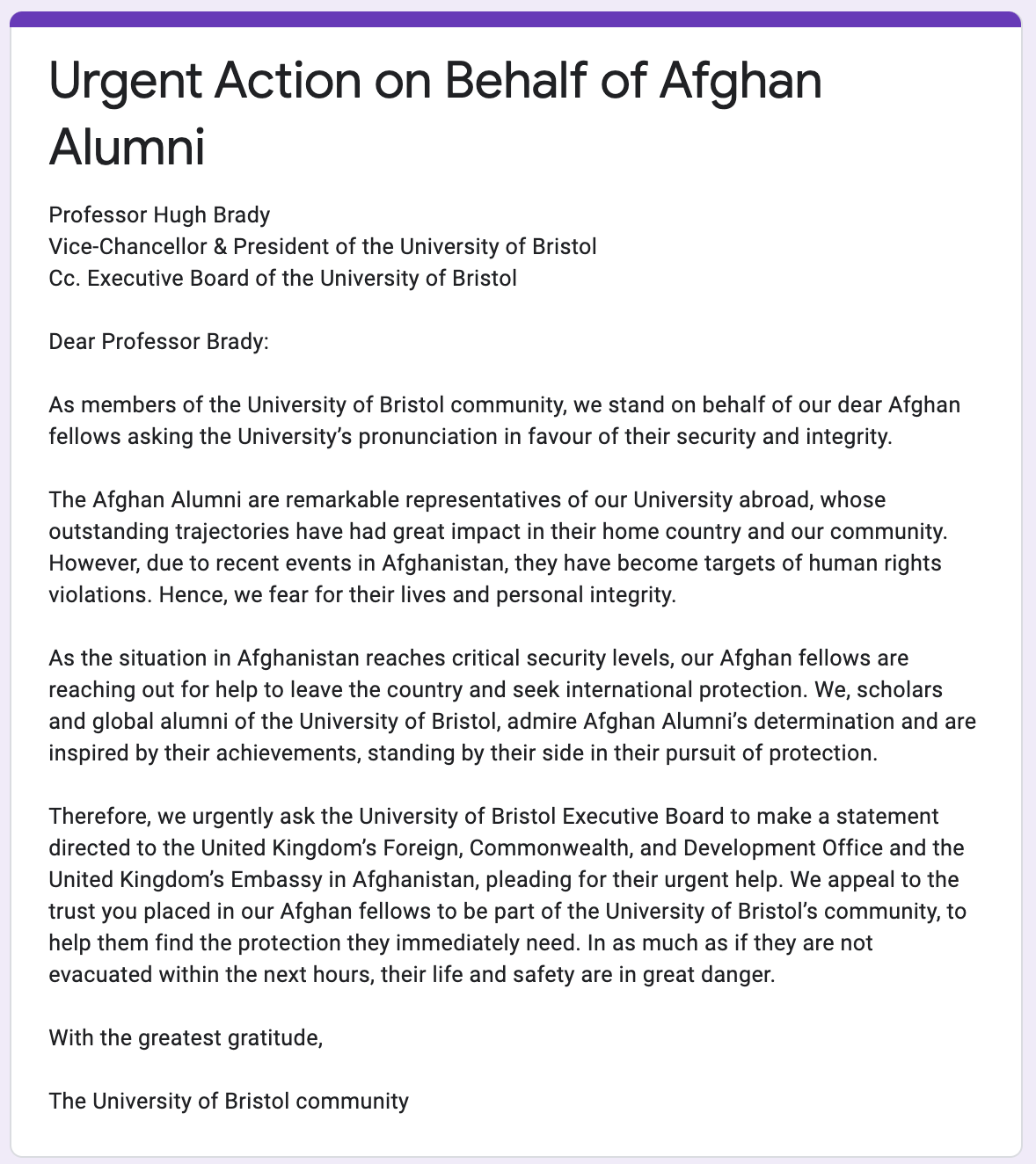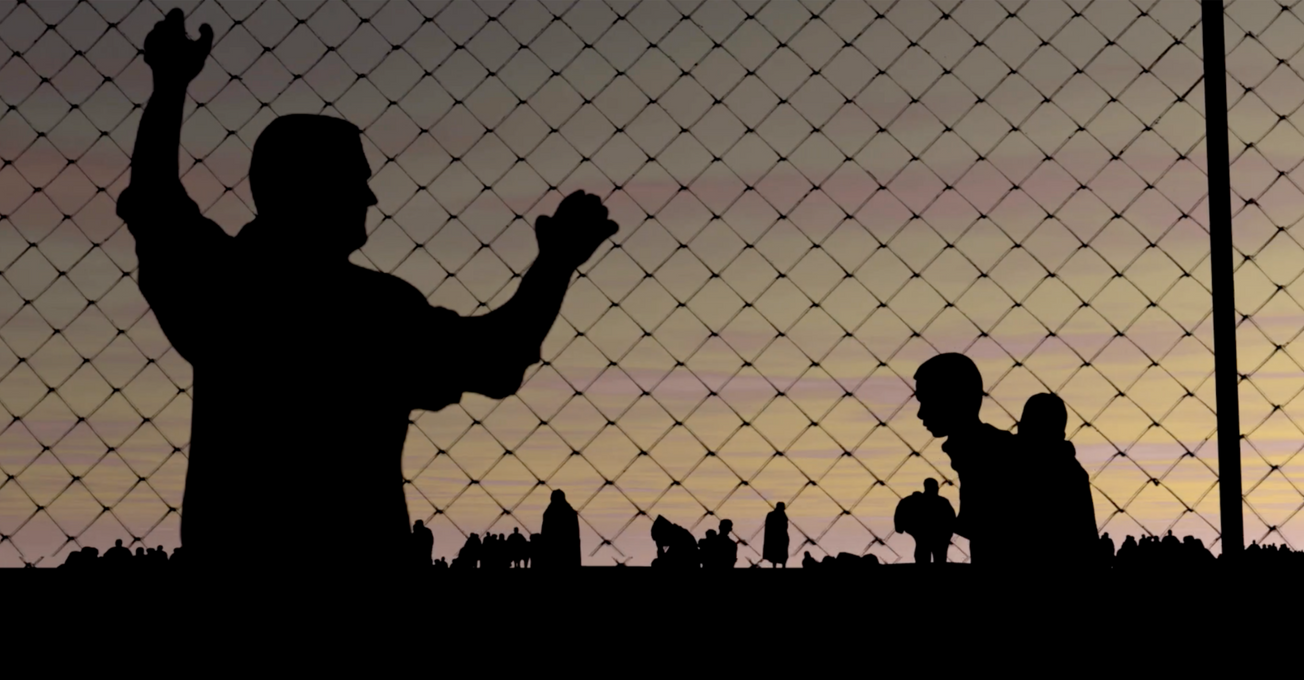By Isobel Turner, News Subeditor
The war in Afghanistan has been going on throughout the majority of most students’ lifetimes. The Taliban controlled the capital, Kabul, from 1996-2001 when U.S enforcements stepped in due to the terrorist threat. After 9/11, Osama Bin Laden who led Al-Qaeda was being protected by the Taliban in Afghanistan at the time. This did not create peace, the Taliban still had large control in the South of the country, and, in May 2006, British troops arrived in Helmand. This shows how Afghanistan has been encapsulated by conflict for over twenty years and, with the Taliban retaking the capital city of Kabul this week, some are suggesting that the war is having an air of redundancy.
Scan the seminal moments of the war in Afghanistan with this timeline. https://t.co/SDeSmXP8f6
— Council on Foreign Relations (@CFR_org) August 20, 2021
What can Bristol students do to help?
Firstly, you can submit this pre-written letter to the Vice-Chancellor and President of the University in support of an urgent appeal on behalf of Afghan alumni asking the University of Bristol’s Executive Board to make a statement directed to the United Kingdom’s Foreign, Commonwealth, and Development Office and the United Kingdom’s Embassy in Afghanistan, pleading for their urgent help.
You can also donate to the urgent appeals by relief agencies such as the International Committee of the Red Cross, the International Rescue Committee and the UN Human Rights Committee.

Under the Taliban rule previously, women have been forced to not continue with their education after the age of ten and to wear burkas. When the Taliban took control of Kabul, universities were evacuated and women struggled to get home due to transport drivers being fearful of helping them at the risk of their own safety.
It is unclear how the Taliban intend to treat women in the immediate future, but many have been told not to leave home without a male relative escorting them and that women will only be allowed to participate in society ‘within the bounds of Islamic law.’ Many female students have burnt their IDs and diplomas out of fear. These students are not unlike students in Bristol with their studious attitude and future career aspirations, however, they have been constantly surrounded by conflict and now their fate is hanging in the hands of the Taliban leadership, notorious for their oppressive and totalitarian attitudes.
Why did the US fight a war in Afghanistan and why did it last so long?https://t.co/PVIri5qKeg
— BBC News (World) (@BBCWorld) August 16, 2021
President Biden declared in April this year that US forces were to be completely withdrawn by September 2021. Due to this, the Taliban already had large amounts of control but have launched a more accelerated attack over the last ten days. Afghanistan security and armed forces quickly broke down despite expensive training programmes from the US. On the 29th of February 2020 the US and Taliban signed a deal on peace in which the Taliban guarantees that the country will not be used for terrorist activities and the US agree to drawdown their troops. However, this has not meant that the country has been peaceful with conflict continuing just days after.
As the US originally sent forces in 2001 due to terrorist threat, this deal has effectively given the Americans no reason to remain. Whilst this makes sense from a hypothetical perspective, it does not consider that the training of Afghan armies seems to have failed, leaving them powerless against the advances of the Taliban. President Biden stresses that the country is still providing humanitarian aid and will continue to be providing Immigrant Visas for Afghans to come to America.
Thousands of Afghan refugees will be resettled in the UK after the Taliban seized control of Kabul, UK government says https://t.co/Jsefp3Ss62
— BBC Breaking News (@BBCBreaking) August 17, 2021
Boris Johnson’s response has not been dissimilar to Biden’s in which he has promised to take in 20,000 refugees to the UK over the next five years with 5,000 to come by the end of 2021. However, the foreign secretary Dominic Raab has been heavily criticised due to delegating a vital phone call with the Afghan foreign minister to junior foreign office. The call was then meant to be rearranged but never was. Johnson is being criticised for not doing enough for the Afghan people and for supporting Raab in his actions.
Therefore, whilst both the US and the UK seem to have progressive methods on paper, it does not seem to be reflected in the current scenes in Afghanistan. Many people remain too scared to leave their homes with no safe access to the airport. At least twenty people are reported to have died attempting to travel to the airport and people attempting the journey have been met with gunshots, teargas and beatings. It has not been denied that despite the promises from Biden and Johnson, a plane still left Kabul ‘almost empty.’
‘At least 20 killed’ at Kabul airport during Afghanistan evacuation effort https://t.co/qPBCLuipMl
— The Independent (@Independent) August 22, 2021
“Dear Antonio Guterres. I worked for the UN in Afghanistan for four years and my inbox is full of Afghans I worked with at the UN desperately pleading for my help in escaping. Kindly advise me who I should refer them to,” said Heather Barr, from Human Rights Watch, on Twitter.
Many people that have been associated with the British and American embassies have been desperately trying to leave the country but the chaotic scenes at the airport are making this almost impossible. Several activists from the Afghanistan Independent Human Rights Commission have been killed in targeted assassinations in recent years and not a single member of the organisation has been evacuated yet. Some have been offered flights but have been unable to access the airport in its current condition.
Whilst this may feel like an issue that is very far from home for many of us in Bristol, our fellow students and fellow humans are suffering in a situation that is not within their power. Urgent appeals are needed rather than just long-term plans that do not appear to be taking place at present.
Featured Image: Epigram / Canva
You can sign the letter to the Executive Board of the University of Bristol HERE









